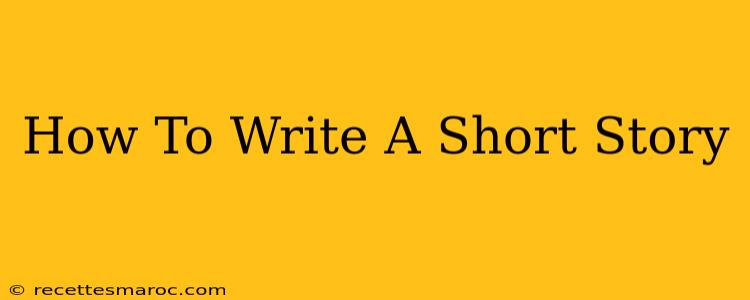So, you want to write a short story? Fantastic! Short stories offer a unique challenge and reward: crafting a compelling narrative within a concise word count. This guide will walk you through the process, from initial brainstorming to final polishing.
1. Finding Your Story Idea: The Spark of Inspiration
Before you even touch a keyboard, you need an idea. Where do you find them? Everywhere!
- Personal Experiences: Draw inspiration from your own life. A memorable event, a quirky character you encountered, or a lingering feeling can all form the basis of a great short story.
- Observations: Pay attention to the world around you. People-watching, eavesdropping (ethically, of course!), and observing everyday interactions can spark unexpected story ideas.
- News and Current Events: Real-life events, even seemingly mundane ones, can be transformed into compelling fiction. Use them as a jumping-off point, not a direct retelling.
- "What if...?" Scenarios: Pose hypothetical questions to yourself. What if your neighbor suddenly had superpowers? What if your pet could talk? Let your imagination run wild.
- Existing Works: Don't plagiarize, but use other stories, poems, or even paintings as inspiration. Think about how you could put a unique spin on a familiar theme or trope.
Developing Your Idea: From Spark to Flame
Once you have an idea, nurture it. Ask yourself:
- What's the conflict? Every good story needs conflict – internal (character vs. self) or external (character vs. character, character vs. nature, character vs. society).
- Who is your main character? Give them a clear motivation, flaws, and strengths. What drives them? What are their goals?
- What's the setting? Where and when does your story take place? The setting should contribute to the mood and atmosphere.
- What's the theme? What's the underlying message or idea you want to explore?
2. Crafting Your Story: Structure and Plot
A well-structured short story is crucial. While flexibility exists, a common structure includes:
- Exposition: Introduce your characters and setting. Don't overwhelm the reader with information; reveal details gradually.
- Rising Action: Build suspense and tension. Introduce the conflict and escalate it.
- Climax: The point of highest tension or drama. This is the turning point of the story.
- Falling Action: The aftermath of the climax. The tension begins to ease.
- Resolution: The conclusion of the story. The conflict is resolved (or not!), and loose ends are tied up.
Show, Don't Tell
Use vivid descriptions and sensory details to immerse the reader in your story. Instead of telling the reader your character is sad, show them through their actions, expressions, and internal thoughts.
3. Writing Your First Draft: Getting the Words Down
Don't worry about perfection in the first draft. Just get your ideas down on paper (or screen). Focus on the narrative flow and the overall story. You can polish it later.
4. Revising and Editing: Polishing Your Prose
Once your first draft is complete, it's time to revise and edit.
- Read it aloud: This helps you catch awkward phrasing and pacing issues.
- Get feedback: Share your story with trusted friends or writing group for constructive criticism.
- Focus on clarity and conciseness: Every word should serve a purpose. Cut unnecessary words and phrases.
- Check for grammar and spelling errors: Use a grammar checker, but don't rely on it entirely. Read carefully!
5. Publishing Your Short Story: Sharing Your Work
Once you are happy with your short story, consider submitting it to literary magazines, online platforms, or anthologies.
Key Takeaways: Remember These Points
- Start with a strong idea.
- Develop compelling characters.
- Create a well-structured plot.
- Show, don't tell.
- Revise and edit thoroughly.
- Be persistent.
Writing a short story is a journey. Embrace the process, learn from your experiences, and keep writing! Good luck!

